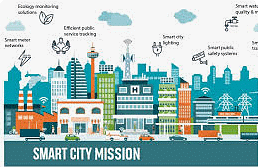PIB Summary- 8th July, 2024 | PIB (Press Information Bureau) Summary - UPSC PDF Download
Smart Cities Mission

Context
Recently, the Central Government has decided to extend the deadline for Smart Cities Mission till 31st March 2025.
What is the Smart Cities Mission?
- The Smart Cities Mission is an initiative of the Union Housing and Urban Affairs Ministry that was launched by Prime Minister Narendra Modi on June 25, 2015.
- Cities across the country were asked to submit proposals for projects to improve municipal services and to make their jurisdictions more liveable.
- Between January 2016 and June 2018 (when the last city, Shillong, was chosen), the Ministry selected 100 cities for the Mission over five rounds.
- The projects were supposed to be completed within five years of the selection of the city, but in 2021 the Ministry changed the deadline for all cities to June 2023, which was earlier the deadline for Shillong alone.
What kinds of projects were proposed?
- After the Ministry gave broad guidelines to the participating cities, the project proposals ranged from making certain stretches of roads more accessible and pedestrian-friendly to more capital-intensive ones like laying water pipelines and constructing sewage treatment plants.
- All 100 cities have also constructed Integrated Command and Control Centres to monitor all security, emergency and civic services.
- During the peak of the Covid-19 pandemic, these centres were converted into emergency response units by many of the cities.
Challenges Faced by the Smart City Mission:
Lack of Clear Definition:
- The Smart City Mission (SCM) lacks a clear definition of what constitutes a smart city, leading to challenges in resource allocation and project prioritization.
Sidelining Elected Representatives:
- Reduced role of elected councils in decision-making raises concerns about democratic governance and accountability within the SCM framework.
Competitive Selection Process:
- Selection of cities through competitive means overlooks India’s diverse urban realities, leading to the exclusion of many areas from development.
Limited Area Development:
- Focus on developing less than 1% of a city’s area results in the neglect of significant portions, impacting overall urban development.
Financial Constraints:
- Inadequate funding compared to the required investment for improving livability in Indian cities poses a significant challenge to SCM’s success.
Governance Structure:
- Misalignment of the Special Purpose Vehicle (SPV) model with the constitutional framework and limited participation of the private sector hinder effective governance.
Social Displacement and Environmental Impact:
- Smart city projects often lead to the displacement of vulnerable populations and environmental disruptions, such as urban flooding.
Steps Needed to Strengthen the Smart City Mission:
Appointment of Dedicated CEO:
- Appoint a dedicated CEO with a fixed tenure and representation from experts and stakeholders to ensure effective leadership and management.
Inclusion of MPs in Advisory Forums:
- Include Members of Parliament (MPs) in State-Level Advisory Forums for their grassroots-level expertise in project identification and implementation.
Emphasis on Pan-City Projects:
- Prioritize pan-city projects for comprehensive development, optimizing resource allocation, and reducing wastage.
Digital Infrastructure Protection:
- Implement mechanisms to protect digital infrastructure from cyber threats and ensure data privacy.
Capacity Building for ULBs:
- Strengthen Urban Local Bodies (ULBs) capabilities in small cities through central government assistance for organizational restructuring and capacity building.
Timely Project Completion:
- Focus on timely project completion by actively intervening in execution and providing necessary expertise and support.
Primary Agricultural Credit Societies (PACS)
Context
Union Minister of Home Affairs and Cooperation Amit Shah urged stakeholders in cooperative societies to support the establishment of primary agricultural credit societies (PACS) in all villages and blocks of the country.
Summary of the recent announcements regarding cooperatives by Union Minister of Home Affairs and Cooperation :
- Union Minister Amit Shah addressed an event in Gandhinagar marking the 102nd International Day of Cooperatives.
- The government plans to establish Primary Agricultural Credit Societies (PACS) in every village and block across India.
- Currently, about 2 lakh gram panchayats lack PACS, which the government aims to address.
- Shah urged cooperative societies to open bank accounts with local banks and support local dairies to bolster the cooperative sector.
- The Ministry of Cooperation has initiated a drive to establish 2 lakh dairies and PACS in gram panchayats.
- In March 2024, the National Cooperative Database was launched to identify and address gaps in cooperative societies.
- The government aims to form PACS in every village by 2029 and plans to introduce a new national cooperative policy within a month to strengthen the cooperative movement, replacing the existing 2002 policy.
About Primary agricultural credit societies:
- PACS is the smallest cooperative credit institution in India and a basic unit.
- The initial Primary Agricultural Credit Society (PACS) was founded in 1904.
- It has a grassroots effect (gram panchayat and village level).
- PACS serves as the last point of contact between the primary borrowers, or rural residents, and the higher agencies, such as the Central Cooperative Bank, State Cooperative Bank, and Reserve Bank of India.
- PACS are governed by the RBI and registered under the Co-operative Societies Act.
- The “Banking Regulation Act-1949” and the “Banking Laws (Co-operative societies) Act 1965” are in charge of them.
Objectives of PACS
- To raise capital for the purpose of making loans and supporting members’ essential activities.
- To collect deposits from members with the goal of improving their savings habit.
- To supply agricultural inputs and services to members at reasonable prices,
- To arrange for the supply and development of improved breeds of livestock for members.
- To make all necessary arrangements for improving irrigation on land owned by members.
- To encourage various income-generating activities through supply of necessary inputs and services.
Functions of PACS
- PACS typically offer the following services to their members:
- Input facilities in the form of a monetary or in-kind component
- Agriculture implements for hire
- Storage space





















